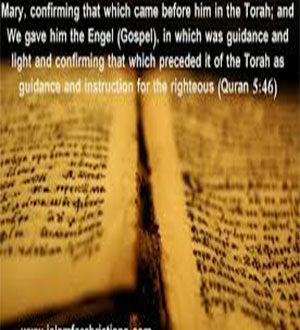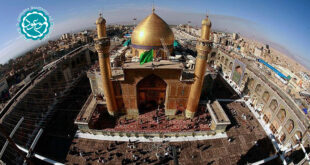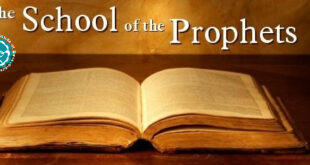Another point we need to make here has to do with the interpretation of “before he dies.” Some believe that this stands for the People of the Book “having faith in Jesus before their own death.” According to this view, everyone from the People of the Book will definitely believe in Jesus before he or she dies. But at the time of Jesus, most of the Jews (who are members of the People of the Book) not only refused to believe in him, but also plotted his death. Then, believing him to be dead, they continued to deny him. In general, the same circumstances are true for the Jews of our own time, as they do not recognize Jesus as a Prophet. As a result, millions of the People of the Book have lived and died without ever believing in Jesus. Therefore, the verse does not speak of the death of this group, but rather of the death of Jesus. In the end, the reality revealed by the Qur’an is this: “Before Jesus dies, all People of the Book will believe in him.”
When the verse is regarded in the light of its true meaning, several clear facts emerge. First, it becomes apparent that the verse refers to the future, because it speaks of Jesus’ death. As explained earlier, he never died but was raised to God’s presence. Jesus will return to Earth, where he will live and die like all other people. Second, it says that all People of the Book will believe in him. Obviously, this has not yet happened. And so, given the context, “before he dies” refers to Jesus. The People of the Book will see and recognize him, and then become Muslim followers of Jesus, as will be explained shortly. In turn, he will be their witness on the Last Day. (God knows best.)
“He is a Sign of the Hour…”
In Surat az-Zukhruf, we are informed of Jesus’ return and some other facts, as follows:
When an example is made of the son of Mary [Jesus], your people laugh uproariously. They retort: “Who is better then, our gods or him?” They only say this to you for argument’s sake. They are indeed a disputatious people. He is only a servant on whom We bestowed Our blessing and whom We made an example for the tribe of Israel. If We willed, We could appoint angels in exchange for you to succeed you on Earth. (Surat Az-Zukhruf, 43:57-60)
The next verse states that Jesus is a sign of the Day of Judgment:
He [Jesus] is a Sign of the Hour. Have no doubt about it. But follow me. This is a straight path. (Surat Az-Zukhruf, 43:61)
Ibn Juzayy says that the first meaning of this verse is that Jesus is a sign or precondition of the Last Hour. We can confidently say that this verse indicates his return at the End Times, because he lived six centuries before the Qur’an’s revelation. Therefore we cannot consider his first life as a sign of the Day of Judgment. The verse says that Jesus will return toward the end of time or, in other words, during the last period of time before the Day of Judgment. In that context, his return is a sign of the Hour’s imminent arrival. (God knows best.)
In Arabic, the expression “He is a Sign of the Hour” is Innahu la ‘ilmun li as-saa’ati.
Some say that the pronoun hu (he/it) in this expression refers to the Qur’an. However if this pronoun is used to denote the Qur’an, we would expect other words to be present, whether before, after, or in the verse, that speak of the Qur’an. The word hu cannot denote the Qur’an when the subject is altogether different. Furthermore, the preceding verse clearly refers to Jesus with the word hu:
He [Jesus] is only a servant on whom We bestowed Our blessing and whom We made an example for the tribe of Israel. (Surat Az-Zukhruf, 43:59)
Those who say that hu refers to the Qur’an rely on the expression “Have no doubt about it. But follow me,” which continues the verse. However, since the preceding verses speak only of Jesus, it is far more realistic to accept that hu refers to him, as in the preceding verses. The great scholars of Islam interpret this pronoun as referring to Jesus, an opinion that they base on other Qur’anic verses and hadiths. In his commentary, Elmalili Muhammad Hamdi Yazir writes that:
No doubt he [Jesus] is a sign of the Hour, one that declares that the Hour will come, that the dead will be resurrected and stand up, because the miracle of Jesus’ second coming and his miracle of resurrecting the dead, together with his revelation that the dead will rise, prove that the Day of Judgment is real. According to the hadiths, his arrival is a sign of the Last Day.”1
“He will teach him the Book and Wisdom, and the Torah and the Gospel.”
Other verses indicating Jesus’ second coming is the following:
When the angels said: “Mary, your Lord gives you good news of a Word from Him. His name is the Messiah, Jesus, son of Mary, of high esteem in this world and the Hereafter, and one of those brought near [to God]. He will speak to people in the cradle, and also when fully grown, and will be one of the righteous.” She asked: “My Lord! How can I have a son when no man has ever touched me?” He said: “It will be so. God creates whatever He wills. When He decides on something, He just says to it: ‘Be!’ and it is. He will teach him the Book and Wisdom, and the Torah and the Gospel.” (Surah Al ‘Imran, 3:45-48)
The last verse reveals that God will teach Jesus the “Book,” the Torah, and the Gospel. Obviously, this book in question is very important. The same expression is also used in the verse given below:
Remember when God said: “Jesus, son of Mary, remember My blessing to you and to your mother when I reinforced you with the Purest Spirit so that you could speak to people in the cradle and when you were fully grown; and when I taught you the Book and Wisdom, and the Torah and the Gospel.” (Surat al-Ma’ida, 5:110)
When we examine how “Book” is used here, we see that it refers to the Qur’an in both cases. The verses reveal that after the Torah, the Psalms and the Gospel, the Qur’an is the final divine book. Some other verses use “Book” to denote the Qur’an, after mentioning the Torah and the Gospel, such as the following:
God, there is no god but Him, the Living, the Self-Sustaining. He has sent down the Book to you with truth, confirming what was there before it. And He sent down the Torah and the Gospel previously. (Surah Al ‘Imran, 3:2-4)
Other verses also call the Qur’an the “Book”:
When a Book comes to them from God, confirming what is with them – even though before that they were praying for victory over the unbelievers – yet when what they recognize comes to them, they reject it. God’s curse is on the unbelievers. (Surat al-Baqara, 2:89)
For this We sent a Messenger to you from among you to recite Our Signs to you, to purify you, to teach you the Book and Wisdom, and to teach you things you did not know before. (Surat al-Baqara, 2:151)
 Mouood Mouood English Edition
Mouood Mouood English Edition




